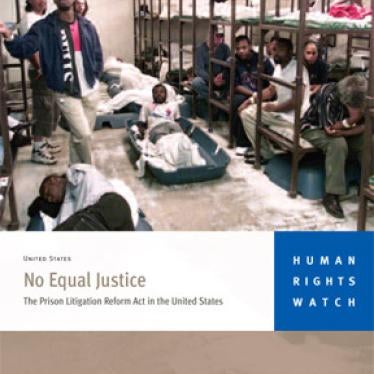(Washington, DC) - The US Congress should amend a 13-year-old federal law that denies prisoners equal access to justice, Human Rights Watch said in a report released today.
The 46-page report, "No Equal Justice: The Prison Litigation Reform Act in the United States," addresses a law passed by Congress in 1996 that singles out lawsuits brought by prisoners for a host of burdens and restrictions that apply to no one else. The report shows that as a result of the law, many cases brought by prisoners seeking the protection of the courts against dangerous conditions of confinement, or a remedy for sexual assault or other abuse by staff or inmates, have been thrown out of court.
"The world was shocked by the abuse of prisoners at Abu Ghraib," said David Fathi, director of the US program at Human Rights Watch and author of the report. "But if those abuses had taken place in a US prison, this law would have barred a remedy in most cases."
Drawing on interviews with former corrections officials, prisoners denied remedies for abuse, and criminal justice experts, "No Equal Justice" examines the effect of the Prison Litigation Reform Act (PLRA) on prisoners' access to justice, and concludes with specific recommendations for reform of the law.
The law limits access to the federal courts for the more than 2.3 million incarcerated adults and children in the United States. Key concerns with the law include:
Prisoners who fail to follow internal complaint procedures to the letter are barred from the courts; before a prisoner may file a lawsuit in court, he must first take his complaints through all levels of the prison's or jail's grievance system, complying with all deadlines and other often complex procedural rules of that system. If the prisoner fails to comply with all technical requirements, or misses a filing deadline that may be as short as a few days, the right to sue may be lost forever.
Victims of sexual assault and other abuse cannot sue unless they also suffer physical injury. A prisoner may not recover compensation for "mental or emotional injury" without making a "prior showing of physical injury." Under this provision, prisoners who have been subjected to sexual assault and other intentional abuse by prison staff have been denied a remedy.
No exceptions for children. The provisions of the law apply not only to adult prisoners, but also to children confined in prisons, jails, and juvenile detention facilities.
Restrictions on court oversight of prison conditions. The law restricts the power of federal courts to make and enforce orders limiting overcrowding or otherwise remedying unlawful conditions in prisons, jails, and juvenile facilities.
Limitations on attorney fees. If a prisoner files a lawsuit and wins, the law limits the amount the prisoner's attorneys can be paid.
The PLRA denies prisoners equal treatment under the law and an effective remedy for violations of their rights, and as such is inconsistent with international human rights law. The United Nations Committee against Torture has specifically called for reform of this law.
"We have been unable to find any other country in the world with a separate and unequal justice system that applies only to prisoners," Fathi said. "The US holds up its legal system as a beacon for the world, but this is hardly an example we would want anyone to follow."
Lawsuits brought by prisoners have historically played a key role in enforcing minimal standards of health and safety in US prisons, jails, and juvenile facilities. But the PLRA has had a devastating effect on prisoners' access to the courts. Since it was passed, the number of lawsuits filed by incarcerated persons has fallen dramatically, and far fewer prisons are under court oversight.
In 2007, Representatives Bobby Scott and John Conyers, Jr. introduced the Prison Abuse Remedies Act, which would have eliminated the PLRA's physical injury requirement, exempted children, and made other reforms to the law, but the bill failed to pass. Human Rights Watch supports the introduction and enactment of similar legislation in the current Congress.







